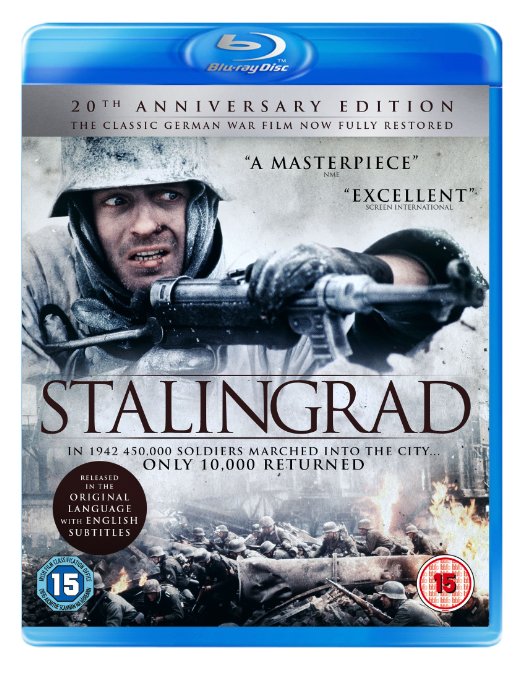
This film is currently available on Netflix in the UK, you can watch it here (or get it here on Amazon).
I was struggling with this film a little bit – I didn’t know whether to place it at 3 1/2 stars or 4; the last thirty minutes really were really good so I cemented that it should be given 4 stars.
As a historian I struggle sometimes with films about historical events, particularly the Holocaust as that is one of my fields of interest. I like the idea of a film because it is able to give a voice to an idea or a subject and that voice can be transmitted to a wider audience than perhaps a book. Take for example the film, The Grey Zone. The title comes from a chapter from Primo Levi’s The Drowned and The Saved, and it challenges the idea the Holcocaust was or still is seen as a black vs. white. Good vs. Evil. Bad Nazi vs. Innocent Jew. He argues history doesn’t like a narrative that doesn’t fit into this black and white morality; but what happens when it’s not clear cut…there were Jews who collaborated with the Nazis…and thus they enter a grey zone – they are not innocent victims nor are they Bad nazis. Levi argues that he cannot judge these people, he was a survivor of the Holocaust and he said I cannot judge a fellow Jew for making the decision to prolong their live, even if it was only for a few months. I like that film The Grey Zone brought this argument to a wider audience, this idea that you cannot see the Holocaust as a purely black or white phenomena, however the problem with the film is that I think it forces the viewer to judge the Jews portrayed within the film and then forces you to change that view. Whilst that is good because it gets you thinking and challenges you, I still can’t help but think the original spirit of The Grey Zone has been lost with the film.
Oh this occasion though I learn more on the idea that this historical film was good because it portrays a great female writer who is perhaps not given as greater credit as she deserves. The film is set in the 1960s and is about Hannah Arendt. Hannah Arendt was a German-Jew who fled to Paris in 1933 after the Nazis came to power. Under German occupation of France, Arendt was sent to Gurs internment camp – where she was able to escape to America. In 1951 she published her first great work, The Origins of Totalitarianism – a book which has ranked highly on several top 100 books. Eight years later she became the first female lecturer at Princeton. This was a woman who was writing remarkable work at a time when Arendt was the wrong gender in academia. I think it’s important to recognise her achievements for her own right, but also to recognise that she did this at a time when a woman’s role was seen in the kitchen. Today, we see the 1960s as the beginning of a sexual revolution and the growth of gender equality, and whilst we can point the origins to there it was not an overnight magic wand that improved gender equality.
The film centres around the Adolf Eichmann trial, Arendt’s coverage of it and her subsequent publication of Eichmann in Jerusalem: A Report on the Banality of Evil. This film helps to highlight some of the controversy surrounding her publication, not least because the book was seen as sympathic to Eichmann and particularly damning towards Israel, but also about some Jewish leaders, particularly those that were seen in league or collaborating with the Third Reich.
Whilst I agree with Levi’s argument that people cannot judge Jews who collaborated with the Nazis in order to prolong their lives, or save as many Jews as possible. I also admire and agree with Arendt. Whilst everyone was arguing Eichmann was a monster, Arendt disagreed and said he was just a man obeying the law, a normal bureaucrat doing a job. In some regards that is very true, what happens when the political system is geared towards the mass extermination of Jews. Do you do you job and follow that system, like a soldier obeying orders…or do say this breaks an international morale code, even if it didn’t break an international code until after the war. I like also that Arendt was not afraid to criticise Jewish collaborators and see all Jews as this Innocent Jew label and she addressed this murky grey zone which exists.
Whilst she is not without controversy and I do agree with some of the critique against her I can draw a parallel with an argument I made with the Historikerstreit. The Historian’s quarrel to give it it’s English name was a debate in the late 1980s in West Germany about the crimes of Nazi Germany. Reading the original article that sparked the debate, I said it wasn’t as controversial now as it was at the time, because we’ve internalised the debate and gotten over the shock of it and reassessed our arguments. I drew a parallel in this argument to the writing of David Irving, who was convicted in Austria for Holocaust denial. Whilst I don’t agree with Irving’s work I do think his controversial work set us into a backlash to prove him wrong and helped us cement key ideas and go over the evidence and strengthen our argument – which is not a bad thing. History would be very boring if no one was brave enough to challenge the status quo and go with the same evidence and never question it. History is not black and white and it is always an interpretation – one that needs to be always challenged and questioned.
What I admire about Hannah Arendt is that she wasn’t afraid to leave her traumatic life events with her own experience with the Holocaust to one side and listen and really judge Eichmann’s trial and come up with a commentary that was different from what others were thinking and then not afraid to publish that argument. Even after the backlash it created. This film helps bring that idea to the forefront, which I think is a good thing.








